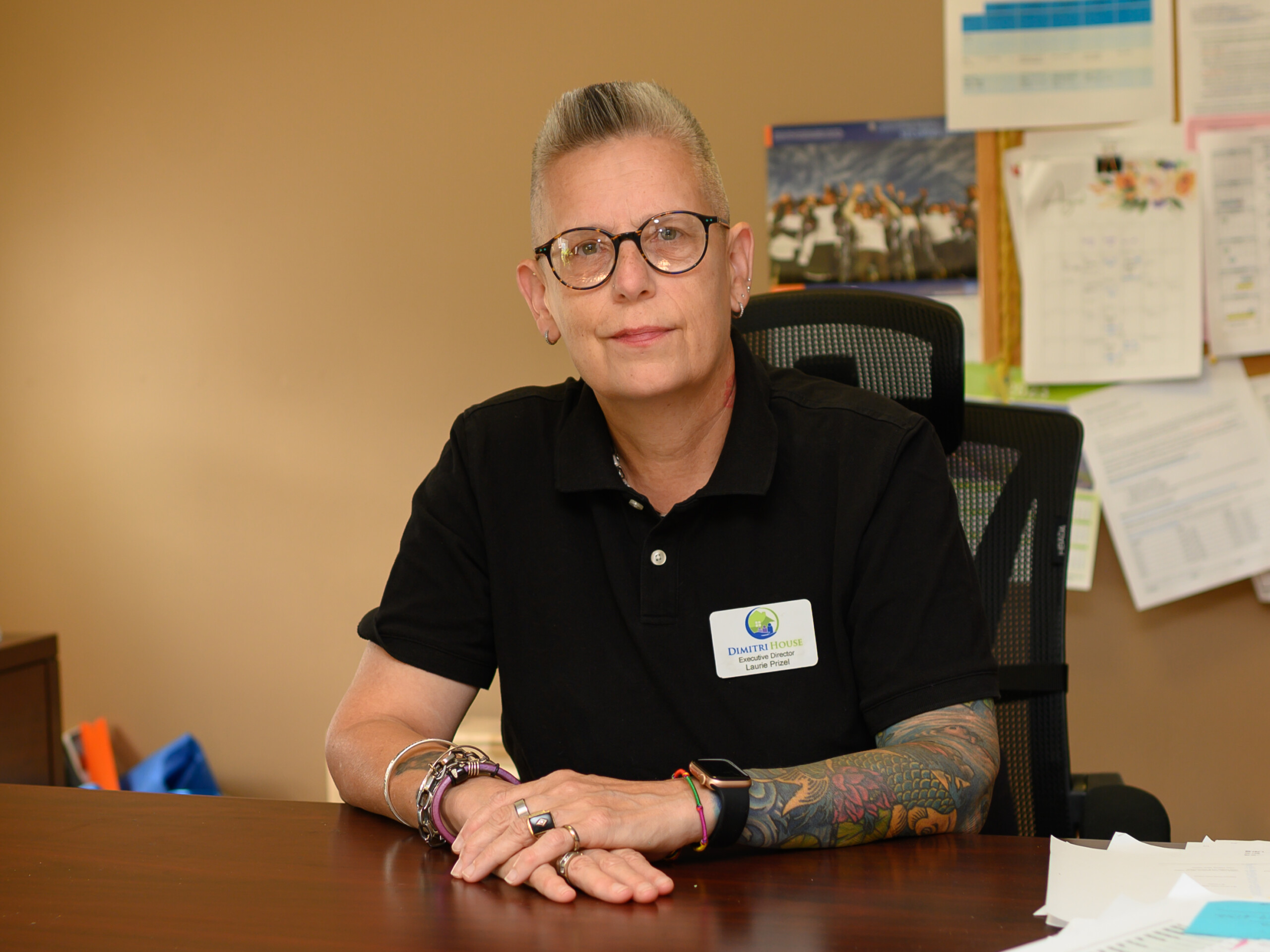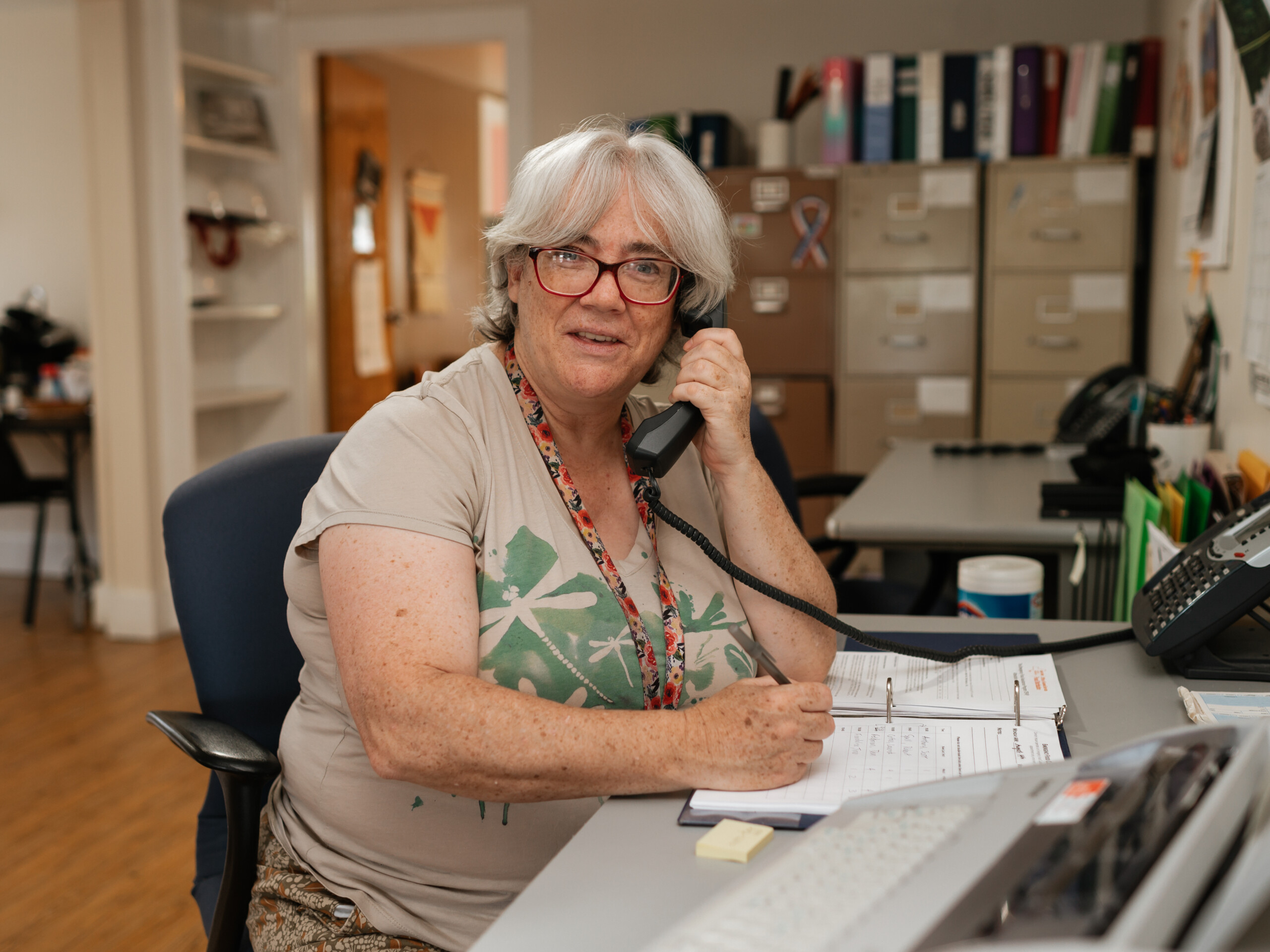When you walk into the dining room of the Dimitri House on North Union street, you feel the warmth of the place right away. “We serve everyone here,” says executive director Laurie Jones-Prizel. A team of volunteers prepares and serves meals for drop-in lunches on Tuesdays, Wednesdays, and Thursdays. Jones-Prizel explains, “We try to serve a nice, nutritional, hot lunch.” Between the drop-in lunch and the food cupboard, she says they served about 4,000 people last year. Many are homeless, but plenty are not, Jones-Prizel explains. Some are simply on fixed incomes: “ . . . a lot of seniors, veterans, people who are struggling to get by.” Two adjacent rooms serve as a food pantry stocked with staples to give to those in need. In an adjacent building is Mamczur Place. It’s a building rehabbed in 2020 in collaboration with New York State to provide six one-bedroom, furnished apartments for permanent supportive housing.
Jones-Prizel is a Rochester native. When she was young, she didn’t have a car, “so I was part of the downtown, city dwelling.” She loves living in Rochester. She would like to see more low-income housing, but is “thrilled” with things like Parcel 5 and all the festivals and theaters. “For a tiny city . . . we do okay.” She has been working in the human services field for about thirty years. Jones-Prizel started out working in the developmental disability field and then “kind of fell into” her current role. “I’ve just always been a human services worker.” She loves the job, she says, and has been doing it for eight years now, because nothing is ever the same from one day to the next. She does accounting, grant writing, “and what you’d call executive director duties,” but then also cooks and bags food for the food cupboard and acts a bit like a case manager to refer people to other resources. “I’m also the chief plumber,” Jones-Prizel says. “You know, anything to save a dollar.” Besides the volunteers, she is often a one-person band. All this variety is good, she says, “because I would never be the person to just sit behind a desk all day.”
Volunteers do their best to connect people with services to make life better, including mental and physical health care, and resources like transitional housing, public assistance, and clothing. “Sometimes you just sit and listen to a homeless person tell their story,” she says.
Because the Dimitri House is smaller than other organizations that provide similar services, it has perhaps been overlooked in some ways. Dimitri House does not have any big corporate sponsors, and Jones-Prizel wonders if it’s because the organization is small. “Money is always a big thing here.” A lot of financial and food donations came in during COVID, which was great, she says. But now, perhaps because people are back to their regular lives and spending money on recreation, this has waned. Grants will only go so far.
Some churches donate money, and church members have done a lot of volunteering over the years. “There are a fair amount of elders who have been big supporters over the years, because they were familiar with the cause from back in the day,” Jones-Prizel says. One big problem? “They are dying.”
Younger generations do not seem to be as connected with this mission of feeding and housing the unhomed. “They are not interested in volunteering,” says Jones-Prizel. The possibility of being homeless is unimaginable to them. Dimitri House ran a shelter for years, and typically had six or seven men sleeping in the shelter rooms, but they’ve had to stop offering the shelter because of a lack of volunteers. “Working with the homeless, or those in poverty… it’s not glamorous,” Jones-Prizel says. It doesn’t appeal to people as much as other volunteer opportunities. The people who do volunteer consistently, whom Jones-Prizel calls “the diehard volunteers,” are wonderful, she says.
Jones-Prizel spends a lot of time trying to dispel the myth that people are unhoused because they are bad people. “There was a man who came in here who had a master’s degree,” she says. He’d had a good job and a nice home until his wife became terminally ill. Medical bills added up, his wife passed away, he struggled with alcohol addiction, and then he lost his job and his house. She knows it might surprise other middle-class people to learn that an unhoused person was once like them, “so I spend a lot of time educating people out there.”
The organization received a large grant to develop Mamczur Place, and it has been a huge success. Residents are given help in the form of case management and peer mentoring. The goal is self-sufficiency. “We literally took chronically homeless people and put them in,” Jones-Prizel says, and “they have all renewed their leases for a third year.” She’s very proud that after a lifetime of homelessness, six individuals are in their own apartments. After meeting basic needs, she says—food, clothing, shelter—then you can talk to people about mental health needs and recovery from addictions. The city and state have been very impressed, and she is hoping to have an opportunity to replicate this in another building at some point. One roadblock is that some city residents do not want to have this type of housing in their neighborhood, even when the buildings are well maintained.
[gtx_gallery]
For anyone interested in volunteering, there’s something for everyone, says Jones-Prizel. Boy Scouts and Girl Scouts have served lunches. She thinks it’s great for young kids to come in see that people experiencing homelessness “are people too.” Students can collect coats and mittens or organize food drives. Mercy High School has been great about having students collect canned food. Companies can do food drives in the office. At Thanksgiving, community members can sign up to provide holiday meals to families. Monetary donations of any size are appreciated. “I write a thank you letter to the guy who brings me five dollars, because I do appreciate it,” says Jones-Prizel. Dimitri House takes any kind of food donations, including fresh vegetables in the summer—the volunteers love to give fresh produce out to people. Since SNAP benefits changed recently, the food pantry has been very busy serving “a lot of people who I call the working poor—people who are working two or three jobs to support their kids,” Jones-Prizel says. “There’s not enough money to go around.”
Even after a career in human services and eight years in this job, Jones-Prizel is amazed by some of the people she meets, and says that they are “wonderful.” It’s humbling, she says, and makes her grateful for her own “tiny” house and food in her refrigerator at home. “And to hear their stories…the things they’ve gone through— it’s even opened my eyes.” Learn more at dimitri-house.org.
Views: 10






